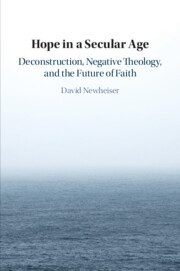Book contents
- Hope in a Secular Age
- Hope in a Secular Age
- Copyright page
- Epigraph
- Contents
- Acknowledgements
- Introduction
- Chapter 1 Deconstruction
- Chapter 2 Negative Theology
- Chapter 3 The Discipline of Hope
- Chapter 4 Beyond Indeterminacy and Dogma
- Chapter 5 Atheism and the Future of Faith
- Chapter 6 Negative Political Theology
- Conclusion
- Bibliography
- Subject Index
Chapter 1 - Deconstruction
The Need for Negativity
Published online by Cambridge University Press: 31 January 2020
- Hope in a Secular Age
- Hope in a Secular Age
- Copyright page
- Epigraph
- Contents
- Acknowledgements
- Introduction
- Chapter 1 Deconstruction
- Chapter 2 Negative Theology
- Chapter 3 The Discipline of Hope
- Chapter 4 Beyond Indeterminacy and Dogma
- Chapter 5 Atheism and the Future of Faith
- Chapter 6 Negative Political Theology
- Conclusion
- Bibliography
- Subject Index
Summary
This chapter argues that, despite its reputation, deconstruction constitutes an ethical practice that preserves the possibility of unpredictable transformation. Theorists such as Rita Felski and Eve Kosofsky Sedgwick claim that critique corrodes the capacity to make affirmative judgments in particular contexts. They echo early critics who associate deconstruction with a pure play that precludes responsible rationality. I argue instead that deconstruction constitutes a discipline of openness to the unexpected. On Derrida’s diagnosis, metaphysical certainty aims to assuage the anxiety that arises in an unstable world; his concern is that this buys some comfort while closing the individual to others. In contrast, deconstructive negativity enables another kind of affirmation – uncertain, subject to revision, and sustained by hope.
- Type
- Chapter
- Information
- Hope in a Secular AgeDeconstruction, Negative Theology, and the Future of Faith, pp. 17 - 39Publisher: Cambridge University PressPrint publication year: 2019

